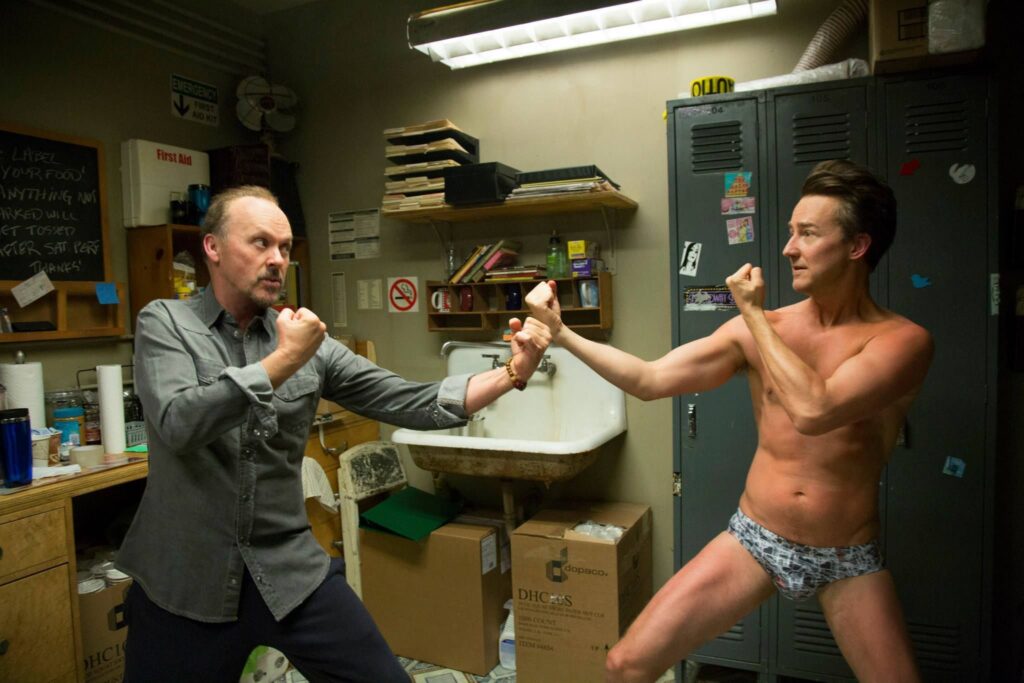Birdman or (The Unexpected Virtue of Ignorance), the latest film from Alejandro González Iñárritu, is a showy directorial performance about performance. By design, it’s swooningly narcissistic, like you might picture an actor to be, and yet it is simultaneously critical of that same narcissism. Its main concern is the idea of being “in the moment,” yet from its depiction of different acting methods to its formal trickery, it tries to suggest that this concern is both a fabrication and a necessity. Whether any of this works for you is going to boil down to how you feel about its tone, which is placed somewhere in the incredibly wide gulf between broad, go-for-broke farce and self-serious how-we-live-now examination.
Michael Keaton is Riggan Thompson, once the star of a popular superhero movie franchise (which provides the film’s title), now desperately trying to resurrect his career and reputation by writing, directing and starring in a Broadway adaptation of a Raymond Carver story. That there are a couple of obvious parallels between Keaton’s real-life career and that of this character are, of course, not accidental. This extra-textual maneuver, like much of Birdman, is simultaneously ostentatious, clever, and predictable.
Riggan has to deal with, among other headaches: junkie daughter Sam (Emma Stone), fresh out of rehab, currently employed as his assistant and still bitter that he was “never around” as a father; prima donnaactor Mike (Edward Norton), a New York theater superstar who trades in an outlandish version of method acting, and who’s sleeping with his lead actress, Lesley (Naomi Watts), a total insecure basket case; Laura (Andrea Riseborough), another actress in his play with whom he is having an affair and who may be pregnant with his child; Tabitha (Lindsay Duncan), a prominent and apparently vicious theater critic; his ex-wife (Amy Ryan); and his lawyer/agent/producer (Zach Galifianakis). To top it all off, there’s Birdman himself: Riggan hears his alter ego’s condemning voice and occasionally seems to display his telekinetic abilities. Each one of these characters is angry at Riggan for being too wrapped up in his work to pay attention to the desperate and very real personalities that demand his attention every day.
As gorgeous as it often is as sheer spectacle, it’s a gamble that only sometimes pays off.
Iñárritu stages all of this interpersonal drama in a similarly “in the moment” fashion, deploying cinematographer Emmanuel Lubezki to create what appears to be a single, unbroken take. The Steadicam hurtles through the cramped backstage hallways, rafters, and dressing rooms of a Broadway theater, between and around everything you can imagine. As gorgeous as it often is as sheer spectacle, it’s a gamble that only sometimes pays off, dangerously treading the line between technique that serves its drama and technique that draws undue attention to itself.
And then there are the tin-eared swipes at critics (Tabitha says she will pan Riggan’s play sight unseen, while he rails at her supposed bitterness at being unable to create art), social media (Sam berates him because he “doesn’t even have a Facebook”), and contemporary Hollywood filmmaking (the idea of aBirdman 4 is seen as intrinsically morally and artistically bankrupt), all attacked with such conviction that it’s nearly impossible to tell if Iñárritu is aware of how cliched these targets are. The film rails against petty distractions that get in the way of an unmediated artistic existence, but any insight it might have offered on this topic is subsumed by its jackhammer broadness. For Riggan, as for Birdman, there’s no room for compromise. Art or death: It’s an extension of the film’s concern with being as present as possible, a condition it sees as fundamentally contradictory at best, especially as Riggan’s own narcissism keeps scuttling his efforts.
“Contradictory” may in fact be the most appropriate adjective for Birdman as a whole. It wishes to say something profound about the creation of art, but chooses to do so in such a self-important manner that it essentially invites the very criticism it condemns. It insists that an artist must forsake their coveted validation in order to make something meaningful, then illustrates that in the most shameless, strutting way available. Overdetermined and yet full of spontaneous energy, insightful and whiny, funny and pandering: Birdman has the ungainly feel of an artist struggling with his best and worst impulses, and though he ultimately succumbs to the latter, it’s all too brazenly sincere to be wholly dismissed.
Review by Matt Lynch

